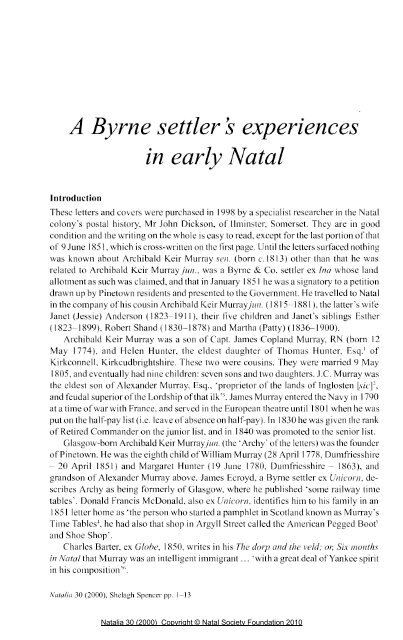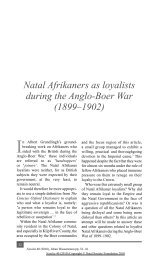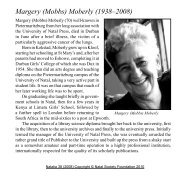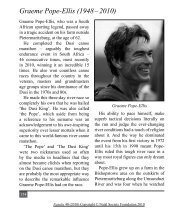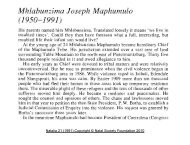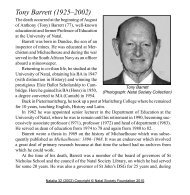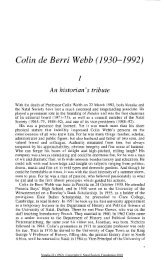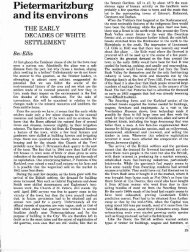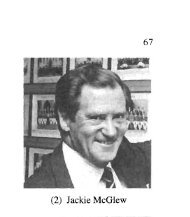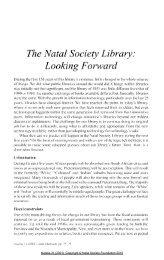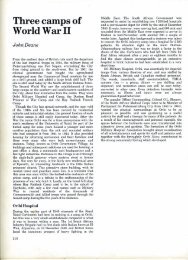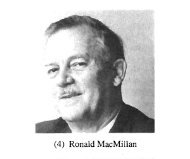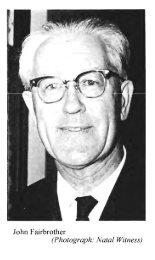A Byrne settler sexperiences in early Natal - Pmbhistory.co.za
A Byrne settler sexperiences in early Natal - Pmbhistory.co.za
A Byrne settler sexperiences in early Natal - Pmbhistory.co.za
Create successful ePaper yourself
Turn your PDF publications into a flip-book with our unique Google optimized e-Paper software.
A <strong>Byrne</strong> <strong>settler</strong> <strong>sexperiences</strong><strong>in</strong> <strong>early</strong> <strong>Natal</strong>IntroductionThese letters and <strong>co</strong>vers were purchased <strong>in</strong> 1998 by a specialist researcher <strong>in</strong> the <strong>Natal</strong><strong>co</strong>lony's postal history, Mr John Dickson, of Ihn<strong>in</strong>ster, Somerset. They are <strong>in</strong> good<strong>co</strong>ndition and the writ<strong>in</strong>g on the whole is easy to read, except for the last portion ofthatof 9 June 1851, which is cross-written on the first page. Until the letters surfaced noth<strong>in</strong>gwas known about Archibald Keir Murray sen. (born c.1813) other than that he wasrelated to Archibald Keir Murrayjllll., was a <strong>Byrne</strong> & Co. <strong>settler</strong> ex In{f whose landallotment as such was claimed, and that <strong>in</strong> January 1851 he was a signatory to a petitiondrawn up by P<strong>in</strong>etown residents and presented to the Government. He travelled to <strong>Natal</strong><strong>in</strong> the <strong>co</strong>mpany ofhis <strong>co</strong>us<strong>in</strong> Archibald Keir Murrayjun. (1815-1881), the latter's wifeJanet (Jessie) Anderson (1823-1911), their five children and Janees sibl<strong>in</strong>gs Esther(1823--1899), Robert Shand (1830--1878) and Martha (Patty) (1836-1900).Archibald Keir Murray was a son of Capt. .lames Copland M UlTay, RN (born 12May 1774), and Helen Hunter, the eldest daughter of Thomas Hunter, Esq.1 ofKirk<strong>co</strong>nnelL Kirkcudbrightshire. These two were <strong>co</strong>us<strong>in</strong>s. They were married 9 May1805, and eventually had n<strong>in</strong>e children: seven sons and two daughters. J.e. Murray wasthe eldest son of Alexander Murray, Esq., 'proprietor of the lands of Inglosten [sicf,and feudal superior ofthe Lordship ofthat ilk '3 . .lames Murray entered the Navy <strong>in</strong> 1790at a time ofwar with France, and served <strong>in</strong> the European theatre until 180 I when he wasput on the half-pay list (i.e. leave ofabsence on half-pay). In 1830 he was given the rankof Retired Commander on the junior list, and <strong>in</strong> 1840 was promoted to the senior list.Glasgow-born Archibald Keir MurrayjulI. (the'Archy' ofthe letters) was the founderof P<strong>in</strong>e town. He was the eighth child ofWilliam Murray (28 April 1778, Dumfriesshire20 April 1851) and Margaret Hunter (19 June 1780, Dumfriesshire 1863), andgrandson of Alexander Murray above . .lames Ecroyd, a <strong>Byrne</strong> <strong>settler</strong> ex Uni<strong>co</strong>rn, describesArchy as be<strong>in</strong>g formerly of Glasgow, where he published 'some railway timetables'. Donald Francis McDonald, also ex Uni<strong>co</strong>rn, identifies him to his family <strong>in</strong> an1851 letter home as 'the person who started a pamphlet <strong>in</strong> S<strong>co</strong>tland known as Murray'sTime Tables+, he had also that shop <strong>in</strong> Argyll Street called the American Pegged Boot"and Shoe Shop'.Charles BaI1er, ex Globe, 1850, writes <strong>in</strong> his The d017) and the veld: Of; Six month"<strong>in</strong> <strong>Natal</strong> that Murray was an <strong>in</strong>telligent immigrant ... 'with a great deal ofYankee spirit<strong>in</strong> his <strong>co</strong>mposition 'I,.<strong>Natal</strong>ia 30 (2000), Shelagh Spencer pp. \-13<strong>Natal</strong>ia 30 (2000) Copyright © <strong>Natal</strong> Society Foundation 2010
4 A <strong>Byrne</strong> <strong>settler</strong> s experiences <strong>in</strong> <strong>early</strong> <strong>Natal</strong>subject ofdivision <strong>in</strong> a <strong>co</strong>lony such as this'. (In 1843 a number ofEstablished Church ofS<strong>co</strong>tland members had seceded and founded the Free Church of S<strong>co</strong>tland, the po<strong>in</strong>t atissue be<strong>in</strong>g their demand that parishioners be allowed to choose their own m<strong>in</strong>isters.Only <strong>in</strong> 1930 was this rift healed.) At a meet<strong>in</strong>g <strong>in</strong> Pietermaritzburg on 10 October 1850it was resolved that a <strong>co</strong>ngregation be formed. From then until March 1851, when heaccepted a call to Pietermaritzburg, Revd CampbelI was based <strong>in</strong> Durban. The thirdletter more or less repeats previous <strong>in</strong>formation, but mentions Congregationalists and a'Mohamedan place ofworship about to be erected'. The latter statement is puzzl<strong>in</strong>g. Noother <strong>co</strong>ntemporary reference has been found to this. The CongregationaJists organizeda church <strong>in</strong> April 185 I, with a teacher, John Corbett Adams, as their first preacher.In the last letter Murray declares his <strong>in</strong>tention to leave <strong>Natal</strong> <strong>early</strong> <strong>in</strong> the new year.As no further references have been forth<strong>co</strong>m<strong>in</strong>g about his presence <strong>in</strong> the <strong>co</strong>lony, itwould seem that he was the Mr Murray who sailed for Cape Town <strong>in</strong> March 1852. Hewas a steerage passenger on the <strong>co</strong>ast<strong>in</strong>g vessel Rosebud.My Dear Father & Mother,D'Urban, <strong>Natal</strong>, 9 1h June 1851.I wrote you some time <strong>in</strong> October last & am not a little surprised to perceive by yourlast letter that it had never reached you, although m<strong>in</strong>e to Mr McLaughl<strong>in</strong> a few weeksearlier had arrived, the latter was forwarded by a private <strong>co</strong>nveyance (a returned emigrant).Yours through the Post Office, but I am only one of many who have to <strong>co</strong>mpla<strong>in</strong>on that head, the result ofwhich a few months past has been the dismissal ofthe former& the appo<strong>in</strong>tment ofanother Post Master here ll ). I may here aga<strong>in</strong> mention that severalof your letters referred to never reached me - My last I wrote on my return fromPietermaritzburg <strong>in</strong> acknowledgement ofyours of21'1 March enclos<strong>in</strong>g the <strong>in</strong>troductionto Mr P<strong>in</strong>e, this was of no use to me further than a few unmean<strong>in</strong>g civilitiesl' .I now have to acknowledge your favors of22 11d Nov. '50, & with<strong>in</strong> these two weeksthat of 1Jlh February, and am <strong>in</strong>deed distressed to notice your anxiety on my ac<strong>co</strong>unt,altho' no doubt you must have heard from Cous<strong>in</strong> Archy's letters that I was well <strong>in</strong>health - I wish to God I <strong>co</strong>uld <strong>in</strong>form I was well <strong>in</strong> other respects. But ofthis anon. TheParcel of newspapers &c. by that of 22 nd Nov. safely reached me, & happened at themoment to be peculiarly acceptable. Many thanks. I am very, very sorry to learn thedeath of Cous<strong>in</strong> James, but more especially to hear by a letter dated <strong>in</strong> March receivedby Cous<strong>in</strong> Archy, that Uncle Murray12 is upon his deathbed - these are melancholynews. On the other hand I cannot but express my gratification here on hear<strong>in</strong>g that both!J.J.X Parents are we]] -long may you <strong>co</strong>nt<strong>in</strong>ue so ... You appear to be very anxious withrespect to my Leg I s<strong>in</strong>cerely wish [ <strong>co</strong>uld pass over this subject <strong>in</strong> silence, as I havehitherto done because the truth will only distress you, but s<strong>in</strong>ce I cannot make it, [ maynow say that it has not been well s<strong>in</strong>ce I landed <strong>in</strong> <strong>Natal</strong> you can form no <strong>co</strong>nceptionof the trouble it has caused me, and at the present time it isalone that<strong>co</strong>mpels me to move about. Two or three weeks before arriv<strong>in</strong>g the steerage ladder
A <strong>Byrne</strong> <strong>settler</strong> s experiences <strong>in</strong> <strong>early</strong> <strong>Natal</strong>5broke down with me, & took the sk<strong>in</strong> all off the bone, after land<strong>in</strong>g I of <strong>co</strong>urse, liken<strong>early</strong> every other fresh arrival, got what is called here '<strong>Natal</strong> sores' a k<strong>in</strong>d ofscab orboil which is peculiar to the climate, & which breaks out mostly on the legs. You mayfancy what a state I was <strong>in</strong> - and now am <strong>in</strong>, for they are far from yet be<strong>in</strong>g ... & whichofthe legs is the worst is a Query. Were it not that I have experienced a few ups & downsalready <strong>in</strong> life, they might affect my spirits worse than they do - although at times I must<strong>co</strong>nfess I feel a s<strong>in</strong>k<strong>in</strong>g ofthe heart occasionally when th<strong>in</strong>k<strong>in</strong>g upon the matter, & whatthey may eventually lead me to. But, we all live <strong>in</strong> the 'Pleasures of Hope' <strong>in</strong> those'blessful visions' of th<strong>in</strong>gs on this side of Time, which, with but too many are but 'thebaseless fabric ofa vision'. But to resume - s<strong>in</strong>ce my last letter has apparently miscarried,I may as well give you <strong>in</strong> a few words a note ofwhat I have been about. You arealready aware that after my land<strong>in</strong>g last year I assisted Archy <strong>in</strong> the disposal ofhis stockofPegg'd Boots & shoes. Afterwards I went up the <strong>co</strong>untry about 12 miles to his propertyLl& staid there for a <strong>co</strong>uple ofweeks to see ifI <strong>co</strong>uld cure my leg, the change did itsome little good. I then came down & be<strong>in</strong>g without employment, I <strong>co</strong>mmenced as aregular day-Iaborer <strong>in</strong> the harbour at 3/6 per day, at this work I <strong>co</strong>nt<strong>in</strong>ued n<strong>early</strong> amonth l \ but be<strong>in</strong>g obliged to wade <strong>in</strong> the salt water occasionally my Leg began aga<strong>in</strong> tolook serious & I was forced to give it up I then became Policeman, a not very agreeableoccupation, but necessity has no law - apprehend<strong>in</strong>g & tak<strong>in</strong>g charge ofcrim<strong>in</strong>als.At this I <strong>co</strong>nt<strong>in</strong>ued aga<strong>in</strong> upwards ofa month, but be<strong>in</strong>g obliged to be on foot always &often at all hours, my unfortunate Leg now began to assume a very alarm<strong>in</strong>g appearance- I <strong>co</strong>nsulted the Doctor, who at once <strong>in</strong>formed the Jailerls that 1 was uniit for dutyrefused lodg<strong>in</strong>gs <strong>in</strong> the Station-House, I was forced to take a small room elsewhere at3/- per week - <strong>in</strong> this room, with my mattress upon the floor, I lay upon my back betterthan .3. months, subsist<strong>in</strong>g upon dry bread & Katfir-tea l (' (J <strong>co</strong>uld not afford a moresubstantial diet). At the expiration ofthat time f<strong>in</strong>d<strong>in</strong>g my Leg <strong>co</strong>nsiderably better & mycash n<strong>early</strong> exhausted 1 was forced to decamp. Just then your letter with the <strong>in</strong>troductionto Governor P<strong>in</strong>e arrived and I at once determ<strong>in</strong>ed upon mov<strong>in</strong>g up to the seat ofGovernment. I took a cast up <strong>in</strong> a Waggon to 'P<strong>in</strong>e-Town', (Cous<strong>in</strong> Archy's place)From him I got the lend of a Horse, & he ac<strong>co</strong>mpanyng me, away we started forPietermaritzburg the result of this I have already stated - we then returned to P<strong>in</strong>eTown Cous<strong>in</strong> Archy happen<strong>in</strong>g at that moment to be <strong>in</strong> want of a Barman to hisAc<strong>co</strong>mmodation House Hut, (he calls it a Hotel, why the erection ofthe two Huts <strong>co</strong>stsomewhat about 30/6 17 ). I offered my services- I now thought I was at last <strong>in</strong> a <strong>co</strong>mparativelysnug berth- 1 was miserably mistaken, however obliged to be on foot allday serv<strong>in</strong>g Grog to drunken waggoners, knocked up at all hours ofthe night - manyof them no sleep at all. Universal referee <strong>in</strong> all subjects of dispute, putt<strong>in</strong>g a stop tofights wait<strong>in</strong>g at table serv<strong>in</strong>g eatables & withal be<strong>in</strong>g obliged to have an everlast<strong>in</strong>g'Yes Sir' <strong>in</strong> my mouth and 'Landlord's laugh' at <strong>co</strong>mmand. I found it excessivelyharrass<strong>in</strong>g, besides I <strong>co</strong>uld scarcely walk now with my legs and Mrs Murray (who now<strong>co</strong>nsidered me <strong>in</strong> the light of a <strong>co</strong>mmon domestic) gave me no rest, <strong>in</strong>terfer<strong>in</strong>g everywhere and <strong>in</strong> everyth<strong>in</strong>g - retir<strong>in</strong>g herself to bed every night at 9 o'clock, she appearedto have no <strong>co</strong>nsideration for the fatigue eithet ofme or her sisters (her sisters were the<strong>co</strong>oks ofthe establishment). Many times after be<strong>in</strong>g up all night, & when I have endeavouredto secure an hour's sleep dur<strong>in</strong>g the day, has she turned me up with the exclamationof'Archy, attend to your bus<strong>in</strong>ess! You did not <strong>co</strong>me here to sleep at these hours'
6 A <strong>Byrne</strong> <strong>settler</strong> :~ experiences <strong>in</strong> <strong>early</strong> "vatalor words to that effect Cous<strong>in</strong> Archy dur<strong>in</strong>g the day was seldom at home, be<strong>in</strong>g generallyoccupied abroad with some of his variolls schemes on hand super<strong>in</strong>tend<strong>in</strong>g thebuild<strong>in</strong>g ofhis new 'Hotel' ,survey<strong>in</strong>g his village allotments, or down here at DurbanI'm <strong>in</strong> fact now his factotum <strong>in</strong> everyth<strong>in</strong>g but the <strong>co</strong>ok<strong>in</strong>g department. Matters <strong>co</strong>uldnot <strong>co</strong>nt<strong>in</strong>ue thus always. In the beg<strong>in</strong>n<strong>in</strong>g ofthe year his brother and sisters lX left them& went away up the <strong>co</strong>untryl9, one afterwards returned at the earnest solicitqtion ofArchy to assist at Mrs M 's ac<strong>co</strong>uchemenfo, but now I believe <strong>in</strong>tends leav<strong>in</strong>g aga<strong>in</strong> veryshortly. In the end of February I likewise <strong>co</strong>mpla<strong>in</strong>ed to my <strong>co</strong>us<strong>in</strong> <strong>in</strong> regard to theharrass<strong>in</strong>g nature ofmy employment & desired to know what I was slav<strong>in</strong>g there for, <strong>in</strong>other words what remuneration he <strong>in</strong>tended giv<strong>in</strong>g me, upon which he said that hav<strong>in</strong>gmade no regular agreement he was under the impression that I wished to rema<strong>in</strong> thereuntil I eould obta<strong>in</strong> more suitable employment. In great wrath I at onee packed up mytraps & aga<strong>in</strong> came down to the Bay here ~ some short time afterwards I met him here &aga<strong>in</strong> renewed the subject. when hc eventually promised to give me ten pounds for myservices dur<strong>in</strong>g the 6 months I was with him - part of that sum I have s<strong>in</strong>ce received, Iknow not whether I ever will the rema<strong>in</strong>der, as no dependence can be placed upon hisword. K<strong>in</strong>d hearted he no doubt is when one is fortunate to f<strong>in</strong>d him <strong>in</strong> the humour. but~~~o':..!J'--..Y--!~~~~-WL!..!..!.!~~. As to his wife, I never was mistaken so much <strong>in</strong> myimpressions, now s<strong>in</strong>ce I have <strong>co</strong>me <strong>in</strong>to <strong>co</strong>ntact with her, or at least she is very muchchanged s<strong>in</strong>ce <strong>co</strong>m<strong>in</strong>g here. All she appears to care for is mak<strong>in</strong>g money & if Archy,herself & children are <strong>co</strong>mfortable it matters not how the rest of her household are. Heon the other hand still <strong>co</strong>nt<strong>in</strong>ues the go ahead person he formerly was, eternally occupied<strong>in</strong> speculations, & when he <strong>co</strong>mes down here gambl<strong>in</strong>g, play<strong>in</strong>g billiards & spend<strong>in</strong>gmoney like water - and this I may here mention, be assured that his character hercnow is vcry far from stand<strong>in</strong>g so high as it did half a year s<strong>in</strong>ce. Two weeks ago heremoved to his new HotePI, which is undoubtedly the best roadside ac<strong>co</strong>mmodationhouse between this & Pietermaritzburg, but this is all he is now do<strong>in</strong>g to any purpose,his projected village P<strong>in</strong>e-Town is not progress<strong>in</strong>g so well as he anticipated, & theemigrants which he managed to locatc upon his land havc <strong>in</strong> part left it & gone elsewhere.S<strong>in</strong>ce I left my <strong>co</strong>us<strong>in</strong>'s I have been aga<strong>in</strong> at Pietermaritzburg (60 miles fromthis) look<strong>in</strong>g for employment, but without success. Hcre I am now hang<strong>in</strong>g about jobb<strong>in</strong>g& liv<strong>in</strong>g from hand to mouth as 1 best can. Bettcr times I hope are yet <strong>co</strong>m<strong>in</strong>g - atpresent they cannot be much worse with me were it not that my unfortunate Legs<strong>in</strong>capacitate me, I would at once volunteer & go down to the seat of war':: upon thefrontier, under Sir Harry Smith. But, what, you will ask, has be<strong>co</strong>me of my fann<strong>in</strong>gspeculations -I answer noth<strong>in</strong>g all is blown to the w<strong>in</strong>ds - farm<strong>in</strong>g is a pure absurditydown <strong>in</strong> the neighbourhood of D'Urban the very few of the <strong>in</strong>habitants or rather sayemigrants who have turned their attcntion that way have now abandoned it & left for theCape of Good Hope <strong>in</strong> disgust. About 100 to 150 miles up the <strong>co</strong>untry beyondPietermaritzburg someth<strong>in</strong>g might be done with capital, but down here it has proved a<strong>co</strong>mplete failure hithcl10. Of the an'ivals of emigrants with<strong>in</strong> a year past, 2/3rds haveleft for the C.G.Hope with the exception of Indian <strong>co</strong>rn, Beet~ Pumpk<strong>in</strong>s, & a fewPotatoes, all our supplies are received from the Capc, & as <strong>Natal</strong> has next to no exports2:'the returns have to bc made <strong>in</strong> money - this of<strong>co</strong>urse must keep the Colony poor.Last year the imports were upwards of£50,000 & the exports about £ 10,000. this speaksfor itself. A <strong>co</strong>lony that is not self support<strong>in</strong>g can never be prosperous, & as the majority
A <strong>Byrne</strong> <strong>settler</strong> 5' experiences <strong>in</strong> <strong>early</strong> <strong>Natal</strong>7of emigrants who have hitherto arrived here are mechanics, laborers, & people of thatstamp. but with very. very few ofany little capital, even manuallabor now is difficult tobe got. Happy are those <strong>co</strong>nsidered, who. after a few months' residence here to see howmatters are regress<strong>in</strong>g, are enabled to leave it for the Cape, notwithstand<strong>in</strong>g the gloomyaspect of th<strong>in</strong>gs down there now, caused by the \Var. Except<strong>in</strong>g Beef, every th<strong>in</strong>g isenormously high here, a 6d Loaf is about the size of a 3d one at home"-lYou are aware, no doubt, ofByme's failure"5, his affairs here are <strong>in</strong> great <strong>co</strong>nfusion.The 'Ina's' passengers have not yet got their Land Orders - to me it now makes littleditlerence Cous<strong>in</strong> Archy had my land certifieate along with his (45 acres) when I leftP<strong>in</strong>e-Town I asked him for it or at least its equivalent <strong>in</strong> value ..~ say perhaps 6 pounds to6 pounds ten shill<strong>in</strong>gs. To this he refused either <strong>in</strong> one way or another, say<strong>in</strong>g that he<strong>co</strong>nsidered the land is justly his for <strong>co</strong>mpensation for my passage out. This is a sampleofhis pr<strong>in</strong>ciple? and how he has made his relatives out here, & others who cannot helpthemselves, subservient to his own aggrandisement & <strong>in</strong>terestS'('. My op<strong>in</strong>ions with respectto his <strong>co</strong>nduct towards me, I have not failed to express publicly here. I understandthat his wife's family are on the way out to <strong>Natal</strong>. I doubt much after a few months'<strong>in</strong>ter<strong>co</strong>urse there will be a fresh split <strong>in</strong> the family. Archy's family are thriv<strong>in</strong>g remarkably.You ask if there are any churches here. There are two <strong>in</strong> D'Urban, one Epis<strong>co</strong>palian& the other a Methodist I attend them occasionally. Mr Campbell the Presbyterianm<strong>in</strong>ister which came out some time ago has now got a church <strong>in</strong> Pietermaritzburg witha very respectable <strong>co</strong>ngregation. When occasion offers I hope you will <strong>co</strong>nt<strong>in</strong>ue to sendme out a newspaper occasionally. Even when I was up at P<strong>in</strong>e-Town, it was only bystealth I <strong>co</strong>uld obta<strong>in</strong> a sight of an English paper - now I never see any ofthem. Whenyou next write to Alexander <strong>in</strong>form him that I am <strong>in</strong> possession ofhis two last letters ofJune '47 & November '49, and that as soon as I have got leasure [s)c] & my m<strong>in</strong>d is atease I will endeavour to write him at some length. Say the same to James. I am not <strong>in</strong> aposition at present to write to anyone as I ought - sitt<strong>in</strong>g upon the floor writ<strong>in</strong>g upon myknees. This J hope will excuse the present way <strong>in</strong> which this scrawl is written. Give myk<strong>in</strong>dest respects to Joseph ~ I have not <strong>co</strong>nvenience just now to write to him either.Remember me k<strong>in</strong>dly to Mr & Mrs Turner & family & all other friends. I hope to beenabled to write you aga<strong>in</strong> shortly <strong>in</strong> the meantime, believe me, when I say often oftendo I th<strong>in</strong>k ofyou & often do I regret <strong>co</strong>m<strong>in</strong>g here to <strong>Natal</strong>.I ever am, My Dear ParentsYours very affectionatelyA.K. MUlTay SrNBDo not fail to put the Sr to my name <strong>in</strong> address<strong>in</strong>g letters to me.Of <strong>co</strong>urse J would not wish Aunt or any others ofour relatives to see this letter.
8 A <strong>Byrne</strong> <strong>settler</strong> <strong>sexperiences</strong> <strong>in</strong> <strong>early</strong> <strong>Natal</strong>My Dear Parents,D'Urban, Port <strong>Natal</strong>4 th , August 1851My letter of 9 1h , June, will, I hope, reach your hands <strong>in</strong> due <strong>co</strong>urse, and <strong>in</strong> somemeasure allay your apparent anxiety <strong>in</strong> my behal f -- I now have the pleasure ofacknow1edg<strong>in</strong>g receipt ofyour note <strong>in</strong>closed <strong>in</strong> Cous<strong>in</strong> Archy's letter by 15 May Steamer to theCape. From it I observe that Uncle Murrayn had paid the debt of nature and gone to'that bourne' where, sooner or later, we must all follow this event from the tenor ofprevious letters, of <strong>co</strong>urse, was not unlooked for. I likewise observe that Brother Tomhad gone to America. I hope, poor fellow, that fortune, not misfortune, will now attendhim. The 'Jane Walker' has not yet made her appearance, but she may be looked fornow every day- the Anderson family, I learn, are all <strong>co</strong>m<strong>in</strong>g out by her - the MissAnderson:!x that came out with us per'Ina' was married lately, ifher sisters are as active,and goodlook<strong>in</strong>g as her, they will not be long before they follow her example - thatclass offemales (not f<strong>in</strong>e ladies) be<strong>in</strong>g <strong>in</strong> demand here. All the folk at P<strong>in</strong>e-Town, are,I understand, <strong>in</strong> good health, but I don't th<strong>in</strong>k bus<strong>in</strong>ess is so brisk with them there as ithas been, or that his speculations are succeed<strong>in</strong>g so favorably as he at one time anticipated.With respect to myselfI am happy to <strong>in</strong>form you that I <strong>co</strong>nt<strong>in</strong>ue <strong>in</strong> my usual health,and that my Leg although far from be<strong>in</strong>g well, is still no worse than it has been for sometime past, and I still live <strong>in</strong> the hope that it will eventually heal up. In addition to the<strong>in</strong>fonnation I gave you <strong>in</strong> my last, I now have to state, that on the 14h June I aga<strong>in</strong>jo<strong>in</strong>edthe Police of this place, until someth<strong>in</strong>g better turns up, or until my unfortunate limbgets sound, when I will endeavour to make a move elsewhere. A Policeman is certa<strong>in</strong>lyfar from be<strong>in</strong>g an agreeable occupation, and the pay is very poor, but it keeps one anoatuntil better times <strong>co</strong>me round. Many here would be glad to get it as 2!3rds of the emigrantswhich came out here have been disappo<strong>in</strong>ted <strong>in</strong> their expectations. A great manylatterly have left for the Cape, and many more would follow ifthey had the means - notthat the <strong>co</strong>untry is bad, but there is a want ofcapitalists, and farnl<strong>in</strong>g does not appear tosucceed unless at a <strong>co</strong>nsiderable distance from the <strong>co</strong>ast, and even there Cattle breed<strong>in</strong>gis the pr<strong>in</strong>ciple [sic] occupation down <strong>in</strong> this neighbourhood Agriculture is <strong>co</strong>nf<strong>in</strong>edto a few acres ofPotatoes, Indian <strong>co</strong>rn, & such like, which is often, as I have witnessed,destroyed <strong>in</strong> a tew hours by the periodical swanns of Locusts. Our supplies of provisionsn<strong>early</strong> all <strong>co</strong>me from the Cape and the Mauritius. This place & Pietermaritzburghave certa<strong>in</strong>ly risen, & arc yet <strong>in</strong>creas<strong>in</strong>g rapidly <strong>in</strong> the way ofbuild<strong>in</strong>gs, such as theyare, but evelY other house is now a shop:"), many ofwhich do not <strong>co</strong>nta<strong>in</strong> £3 amount ofproperty, <strong>in</strong> this way folk manage to live from hand to mouth, mak<strong>in</strong>g an existence. Imyselfjob about, ... mak<strong>in</strong>g a shill<strong>in</strong>g when I can this is <strong>co</strong>lonial life - and thank God,I am able to do it, neither do I <strong>co</strong>nsider it, as many might do, a hardship.I need say noth<strong>in</strong>g <strong>co</strong>ncern<strong>in</strong>g the War on the frontiers with the Kaffirs, as now s<strong>in</strong>ceSteamers run to and from the Cape ofGood Hope, you hear through the newspapers allthat goes forward more <strong>co</strong>rrectly, and n<strong>early</strong> as soon as we do here. Every th<strong>in</strong>g is quiet<strong>in</strong> <strong>Natal</strong>- the seat ofWar be<strong>in</strong>g n<strong>early</strong> 500 miles distant from us, and no <strong>co</strong>mmunicationexcept by sea occasionally from Algoa Bay and the Cape.... Expect to hear from meaga<strong>in</strong> shortly <strong>in</strong> answer to your expected favour per '.lane Walker'. I will likewise en
A <strong>Byrne</strong> <strong>settler</strong> :s' experiences <strong>in</strong> ear(v <strong>Natal</strong>9deavour to make up a long letter to Alexander <strong>in</strong> time for the next spr<strong>in</strong>g ship. But I mayas well mention for your <strong>in</strong>formation, that <strong>in</strong> my present employment I have not muchtime to spare, although occupation makes my m<strong>in</strong>d easier than it has been lately.Give k<strong>in</strong>dest respects to all the Dunlosk<strong>in</strong> folks ' °, as well as other friendsAnd believe me, as always,Yours most affectionately,A.K. MurrayMy Dear Father & Mother,D'Urban, <strong>Natal</strong>, 20 Dec. 1851.My last to you was under date of 4th August, and am sorry to th<strong>in</strong>k that I haveallowed a longer time to elapse <strong>in</strong> aga<strong>in</strong> writ<strong>in</strong>g, than I at that time <strong>in</strong>tended - but,<strong>in</strong>deed, you must make allowances, and take <strong>in</strong>to <strong>co</strong>nsideration that I have not now the<strong>co</strong>nvenience or even the time to keep up my <strong>co</strong>rrespondence with old friends that I had<strong>in</strong> bygone days not by any means that I would wish to extenuate neglect on my part1QyQ1!, but, because, what <strong>in</strong> f01l11er days I used to <strong>co</strong>nsider as a pleasure, is really nowbe<strong>co</strong>me an effort not but that I have the will. but that my present occupations are soharrass<strong>in</strong>g and often so disagreeable, that as soon as I am offduty, I am fitter for my bedthan anyth<strong>in</strong>g else ....I now have the satisfaction to acknowledge receipt of your favors of 22 May, 9 hJuly, and I Qth Sept. It appears to me somewhat strange that at the date ofyour last youhad not received m<strong>in</strong>e written <strong>in</strong> June last. but I suppose it must have arrived too late atthe Cape for the mail ofthat month J' , these <strong>in</strong><strong>co</strong>nveniences often occur between this andthe Cape ofGood Hope as we have only <strong>co</strong>ast<strong>in</strong>g vessels to rely upon, & these sail<strong>in</strong>g atperiods to suit their own purposes.... I am sadly grieved to th<strong>in</strong>k that the absence ofletters from me has caused you so much uneas<strong>in</strong>ess - but some how the idea ofwrit<strong>in</strong>ghome bad ac<strong>co</strong>unts to you makes me so miserable that I defer do<strong>in</strong>g so from week toweek <strong>in</strong> anticipation of prospects improv<strong>in</strong>g Va<strong>in</strong> Hope.-- noth<strong>in</strong>g but disappo<strong>in</strong>tmentshave hitherto attended me here <strong>in</strong> NataL nor does the horizon appear to clear upas time wears on. One piece of good news, however, I am right glad to <strong>in</strong>form you of,viz. that my leg (unfortunate limb!) has at length been <strong>co</strong>axed <strong>in</strong>to what I <strong>co</strong>nsider asanitary state, and although far from be<strong>in</strong>g yet well, still I have now hopes it will ultimatelyget sound you can have no idea what misery the wretched member has eausedme s<strong>in</strong>ce I set forth on 'Afric's burn<strong>in</strong>g sands'. My long <strong>co</strong>nf<strong>in</strong>ement under your foster<strong>in</strong>gcare was felicity <strong>co</strong>mpared to the 4 months I suffered here, lay<strong>in</strong>g upon the floor ofa small room, without a friend to do a hand's turn for me, and liv<strong>in</strong>g upon 6d a day,<strong>in</strong>deed, I was afterwards <strong>in</strong>formed that it would not have been so bad at that time had Ibeen supplied with proper o<strong>in</strong>tment J2 . Thank God, my health then, and ever s<strong>in</strong>ce, has<strong>in</strong>variably been good, and to this alone am I <strong>in</strong>debted for not be<strong>in</strong>g 'ere this under thesod As to sickness ofm<strong>in</strong>d, or as it is <strong>co</strong>mmonly expressed' Lowness ofsprits' , I must<strong>co</strong>nfess it does occasionally get the upper hand, but I have now first and last be<strong>co</strong>me so
10 A <strong>Byrne</strong> <strong>settler</strong> ~\' experiences <strong>in</strong> ear(y <strong>Natal</strong>steeped <strong>in</strong> disappo<strong>in</strong>tments that I am <strong>in</strong> a measure callous <strong>co</strong>ncern<strong>in</strong>g the Avenir youmay, however, safely rely on my hold<strong>in</strong>g fast my <strong>in</strong>tegrity and that it shall be my earnestendeavour never to forget the glorious precepts taught me by you, <strong>in</strong> younger, happierdays Apropos you have on more than one occasion enquired ifthere are any Churchac<strong>co</strong>mmodation here we have 3 I Epis<strong>co</strong>palian, I Methodist, and a Congregationalist,besides a Mahomedan place of worship about to be erected.]Jalways make a po<strong>in</strong>t ofattend<strong>in</strong>g the Methodist chapel, when duty permits me. Bythe by, Mr Campbell, the Free Church m<strong>in</strong>ister who came out some time ago, hav<strong>in</strong>gbeen lately, I understand, released by the Synod of Dumbarton from his charge there,(Established, & Free Kirk folks are synonymous here) has now a Presbyterian Church <strong>in</strong>Pietermaritzburg, & as his <strong>co</strong>ngregation have by an effort, managed to subscribe upwardsof 50 pounds, the Colonial Government, (as <strong>in</strong> all similar cases) will double it<strong>co</strong>nsequentlyhe is <strong>co</strong>mfol1able N.B. the Dutch Boers <strong>in</strong> Africa are all Protestants, sayPresbyterians.I have <strong>co</strong>nt<strong>in</strong>ued <strong>in</strong> the Police force of this place s<strong>in</strong>ce June last, but it is my <strong>in</strong>tentionto leave it the end of the month, now that my Leg is gett<strong>in</strong>g sound, as noth<strong>in</strong>g is tobe got by rema<strong>in</strong><strong>in</strong>g <strong>in</strong> it, - only a bare liveIihood- a mere pittance, for which one isharrassed about, <strong>co</strong>nt<strong>in</strong>ually on your legs from 6 a.m. to 9 p.m. and 9 p.m. to 6 a.m.month about alternately it is so very disagreeable to me to be <strong>co</strong>nt<strong>in</strong>ually guard<strong>in</strong>gfelons & arrest<strong>in</strong>g thieves, & I can assure you from the low state ofthe <strong>co</strong>lony & <strong>co</strong>nsequentwant of work, we have an abundance of that class here. In the beg<strong>in</strong>n<strong>in</strong>g of theyear I shall make a bold push for some other place, J care not where, & aItho' without5/- <strong>in</strong> the world to call my own, better do that than fritter away onc's days without theprospect ofdo<strong>in</strong>g any good here- perhaps I may f<strong>in</strong>d my way to Algoa Bay where, fromthe <strong>in</strong>flux oftroops to the seat ofwar, money must be circulat<strong>in</strong>g, or should opportunityoffer I may endeavour to get to the Mauritius, & if no employment can be had there,thence, if possible, to Australia, where I believe, gold has lately been dis<strong>co</strong>vered <strong>in</strong>abundance. Here, positively, there is noth<strong>in</strong>g do<strong>in</strong>g just now, and th<strong>in</strong>gs appear to begett<strong>in</strong>g from bad to worse, the <strong>co</strong>untry is good enough & the climate delightful, but wehave next to no capitalists here to carry on farm<strong>in</strong>g, <strong>co</strong>nsequently no exports, ... thatmany are <strong>in</strong> great difficulties and not a few <strong>in</strong> town, which I know, are work<strong>in</strong>g for theirf()od. S<strong>in</strong>ce Byrnc's failure (he is now here]]) cmigration has of late ceased - thosealready arrived, who have been able to scrapc together the mcans or who have had theopportunity, have all left the <strong>co</strong>lony .... This <strong>co</strong>untry no doubt may prosper <strong>in</strong> time, butit will not be <strong>in</strong> our day, & then only by the importation ofa wealthier class ofemigrantsthan those which have hitherto arrived, besides the Kaffirs are sure, sooner or later, togive trouble, perhaps sooner here than many anticipate already are they be<strong>co</strong>me very<strong>in</strong>solent & <strong>in</strong>dependent, & will only work when it suits themselves.E're this, I suppose, you will have heard ofthe safe arrival ofthe Anderson family'-I.I saw them all after land<strong>in</strong>g they are now up at P<strong>in</strong>e Town, & the old man I understand,has several acres of ground turned up & under cultivation I seldom see <strong>co</strong>us<strong>in</strong> Archienow, if we meet we arc civil enough to each other but noth<strong>in</strong>g more .... J do not th<strong>in</strong>kmatters of late havc been turn<strong>in</strong>g out so well with him as he at one time expected. Hebeg<strong>in</strong>s now, I believe, to feel the pressure ofthe times as well as many others. tIis Hotelbus<strong>in</strong>ess J observe, is advertised <strong>in</strong> the papers to lease, as he now <strong>in</strong>tends to devote histime to faml<strong>in</strong>g this is the wife's work, I am sure, for, ifreport speaks truth, he has now
A <strong>Byrne</strong> <strong>settler</strong> s experiences <strong>in</strong> <strong>early</strong> <strong>Natal</strong>11be<strong>co</strong>me too jolly a landlord and so far as appearances go, he both looks like it, hav<strong>in</strong>gnow be<strong>co</strong>me as big as a puncheon, with a round puffed up brandy <strong>co</strong>untenance - whenhe <strong>co</strong>mes down here, I know, he carries on [?sad] orgies - I generally endeavour to keepout of his way when he is <strong>in</strong> town. He is ... now better known than he has been <strong>in</strong> <strong>Natal</strong>- more respected for position than pr<strong>in</strong>ciple, although to give the Devil his due he is aclever persever<strong>in</strong>g fellow, &just the person suited for the <strong>co</strong>lony. His wife's family willnow be of great use to him on the farm, as they will <strong>co</strong>st him noth<strong>in</strong>g but their food &leave Mrs M., alone for keep<strong>in</strong>g them at work.Hav<strong>in</strong>g now exhausted my subject matter, at least such as I th<strong>in</strong>k will be <strong>in</strong>terest<strong>in</strong>gto you, I will <strong>co</strong>nclude, that you may depend upon hear<strong>in</strong>g upon my further movementsnext month, as I shall be certa<strong>in</strong> to let you know where I am go<strong>in</strong>g previous to leav<strong>in</strong>gthe <strong>co</strong>lony. In the meantime I shall anxiously look forward for the arrival ofnext mail <strong>in</strong>the hope to hear<strong>in</strong>g aga<strong>in</strong> from you - Adieu! And rely upon it, that wherever I maywander, & whatever hardships are yet before me, never suppose for a moment that Ishall forget my duty to you, or cease to remember you with that affection which you sowell merit.Yours most s<strong>in</strong>cerely and affectionately,A.K. MurrayP.S ... Give my k<strong>in</strong>d respects to Mr and Mrs Turner & family, also to Cous<strong>in</strong> Joseph &wife, & Brother .lames ... There is yet, I hope, 'a good time <strong>co</strong>m<strong>in</strong>g'.NOTES1. The term 'Esquire' was a mean<strong>in</strong>gfultit1c at this time. For example. <strong>in</strong> the Dir('cfOlT o/DlIriJall andPi('f('m/(/rif::'/JllIg for I R53 (Pietennaritzburg: Lumb. 1852). <strong>in</strong> the Durban list of residents there were29 Esquires among the 349 males listed.2. It would appear that this is an error for Ingleston. Kirkcudbrightshire.3. W.R. O'<strong>Byrne</strong>: A /1(1\'(// /Jiographica/ dicfioll(IIT... London: John Murray. I R49. pp. 801-2.4. There is <strong>co</strong>nfusion about the publish<strong>in</strong>g <strong>co</strong>nneetion - his son Joseph's death notice <strong>in</strong> the press <strong>in</strong> 1882describes him as the nephew of Alexander Murray. 'the well-known S<strong>co</strong>ttish publisher of timetablesand guide books'. while a t~llnily history written by a descendant. ma<strong>in</strong>ta<strong>in</strong>s that Archy was <strong>in</strong> partnershipwith his elder brother Thomas. a bookseller and publisher or Glasgow. and they drew up the firstS<strong>co</strong>ttish rai Iway guide known as iv111rra.1" \. Till/(' Ta/J/('s (1841 ). follow<strong>in</strong>g the appearance of the tirstsuch publication Bradshm)'\' Raiilm.1" Til7l(, Tah/cs <strong>in</strong> 1839. See R.W. Anderson: William Anderson( 1790-1873) and his descendants. Typescript. 19R4.5. Pcgged boots were <strong>co</strong>nstructed with the use of small wooden p<strong>in</strong>s or pegs to seeure the upper betweenthc <strong>in</strong>ner- and the outer-sole. The po<strong>in</strong>ts of the pegs were then eut away and smoothed level with the<strong>in</strong>ner-sole.6. Charles [3arter. The dOlI) alld fhe "cid.... London: Ward Lock. 1852. p.19. D. F. McDonald ma<strong>in</strong>ta<strong>in</strong>edthat Archy had been <strong>in</strong> America (this must have been before his marriage <strong>in</strong> IR41). while Dr W.H.1.Bleek. thc philologist. thought he was an American. Possibly his promotion of pegged boots hadsometh<strong>in</strong>g to do wilh Ihe Ameriean association. See Rita 81eksley. 'A letter Irom the past'. Persolla/<strong>in</strong>'9 June 1966. and 0.11. Spohr. ed. Tlte Naw/ diaries of!)r WH.I Hfeek, 1855 185(j ... Cape Town:Balkema. 1965. p.92.7. Alfred Southam. who was <strong>in</strong> <strong>Natal</strong> from 1848 50. ma<strong>in</strong>ta<strong>in</strong>ed that apart from a few acres of <strong>co</strong>tton andsugar-cane and a fCw tropical fruits. the sole f~\fIn<strong>in</strong>g product was oats for horses. while the onlyfanners <strong>in</strong> the <strong>co</strong>untry 'of any <strong>co</strong>nsequence'. were the Ati-ican women who raised "great quantities ofIndian <strong>co</strong>rn' which they sold to the \\hites for fodder. See CireatBrita<strong>in</strong>. Parliamentary papers XLV no.596 (1860) p.94.R. H'llf-pay ot1icers however. were free. with the pcrmission of the Admiralty. to follow othcr avocations9. <strong>Natal</strong> sore a pa<strong>in</strong>ful s\\cll<strong>in</strong>g that bursts. form<strong>in</strong>g an ulccr. Probably impetigo. ,1 bacterial <strong>in</strong>fCclion
12 A <strong>Byrne</strong> <strong>settler</strong>~' experiences <strong>in</strong> <strong>early</strong> <strong>Natal</strong>which can enter a lesion caused by the scratch<strong>in</strong>g of a tick, flea or mosquito bite. Horatio Vertue exAlilml describes them as 'pa<strong>in</strong>ful and troublesome to cure' . Vertue's 'unfortunate werc <strong>co</strong>veredwith them, and 'it is cruel work after work<strong>in</strong>g like a slave all day to be tormented at night'. Sixlater (5 Jan. 1850) he writes, 'I have been cruelly punished with my legs, and am scarcely able to crawlabout'. Sce P.W Laidler and Michael Gelfand, South Aji-icu: its medical histon' 1652~/898. CapeTown: Struik, 1971, and Horatio Vertue, Journal 4 August 1849 c. November~ December 1851 (MrEric Vertue, Helderberg Village, Somerset West).10. On 1 March 1851 Francis Spr<strong>in</strong>g, an officer with experience <strong>in</strong> the Hong Kong post otTice, wasappo<strong>in</strong>ted Post Master General for <strong>Natal</strong>, and was stationed <strong>in</strong> Durban. Prior to this William RobertShaw Wilson, the act<strong>in</strong>g clerk to Durban's Resident Magistrate, had acted as postmaster dur<strong>in</strong>g theillness of the postmaster, Valent<strong>in</strong>us Alexius Schonnberg (c. 1812~75). See John Dickson, Theborne mails of <strong>Natal</strong> part I: from the beg<strong>in</strong>n<strong>in</strong>g to 1850, <strong>Natal</strong> and Zulu/and post vol.2(2) June 1998,pp.27~A7.11. Benjam<strong>in</strong> Chilley Campbell P<strong>in</strong>e (1809~91) landed <strong>in</strong> <strong>Natal</strong> on 16 April 1850, and rema<strong>in</strong>ed theColony's Lt.-Govemor until he departed on leave <strong>in</strong> Mar. 1855. He did not then retum, and was succeededby Sir John S<strong>co</strong>tt. P<strong>in</strong>e had a se<strong>co</strong>nd, brief. term of office <strong>in</strong> <strong>Natal</strong>, 1873~75. It would seem that fewemigrants were <strong>in</strong> a position to produce letters of<strong>in</strong>troduction to senior ofl\cers ofthe <strong>Natal</strong> Govemment.It was rare that such letters had any effect.12. i.e. William Mun'ay (I778~1851), father of Archy.13. At P<strong>in</strong>ctown.14. It <strong>co</strong>uld be that Murray was assist<strong>in</strong>g <strong>in</strong> land<strong>in</strong>g cargo and gett<strong>in</strong>g it passed through the CustomsHouse. Fellow Ina passenger. Thomas Duff. was engaged <strong>in</strong> this work at 3/6d and a day from 1 to9 April. See the repr<strong>in</strong>t ofF;rst impressions o/'Natul h1' a Perthsizire Ploughman (1850) <strong>in</strong> Nata/ia 7,1977)Thomas Dand. Dand was also the owner of the premises leased to the <strong>Natal</strong> Govemment as Durban'sgaol and hospital.16. 'Kaffir tea'. ac<strong>co</strong>rd<strong>in</strong>g to George Russell's HistOl:r oloid Durhal1. (Durban: Davis, 1899) was <strong>in</strong>fuscdfrom an <strong>in</strong>digenous herb. At/zrixia phl'/icijcJ/ia, which was cheaper than the tea imported from theCape, and was both 'nutritive and refresh<strong>in</strong>g'.17. It is known that A.K. Murray sen. was <strong>in</strong> P<strong>in</strong>etown <strong>in</strong> January 1851 . .lames Ecroyd. aUni<strong>co</strong>rll passenger,who slept at Murray's hotel ('11 roule to Pietermaritzburg from Durban on the night of 7/8 January,describes the ac<strong>co</strong>mmodation thus ... 'The beds were stretchers made of branches with strong canvasstretched across to sleep on. No mattress, simply a rug and a sheet to sleep on.' He was 'devoured byfleas. The dust floor had not been swept for weeks. There were four beds, all occupied. In the centre ofthe room was a large table at one end of which were bottles of brandy. g<strong>in</strong>, etc. & tumbler glasses. Twomore travellers arrived <strong>in</strong> the night & f<strong>in</strong>d<strong>in</strong>g all ac<strong>co</strong>mmodation taken. eaeh had a glass of brandy &went on.' James Eeroyd, Le//ers. l850~51. (Killie Campbell Afrieana Library, Durban)18. i.e. Esther. Robert and Martha.19. Possibly to Ladysmith.20. Arehy and lanel's 6'1; child. Jessie, was bom on 13 March 1851.1. Arehy appears to have had this under <strong>co</strong>nstruction by the latter quarter of 1850 when lJni<strong>co</strong>m pa~;se]ng(~rDonald Francis McDonald worked on it. Once <strong>co</strong>mpleted McDonald described it as 'a f<strong>in</strong>e largehotel ...with every ac<strong>co</strong>mmodation. such as stables, kraal & outhollses.' Supra Rita Bleksley.22. i.e. the Eighth Frontier War, 1850-53.23. This latter statement <strong>co</strong>rroborates Iloratio Vertue's avowal that he thought 'but little of a <strong>co</strong>untry thathas !lQ export. and I doubt if it ever will'.Horatio Vertue, writ<strong>in</strong>g <strong>in</strong> January 1850, ma<strong>in</strong>ta<strong>in</strong>ed that 'wheaten bread', butter, milk and cheesewere too expensive to eat..Ioseph Charles Byme, whose <strong>Natal</strong> Emigration and Coloni<strong>za</strong>tion Co., brought 2 700-odd <strong>settler</strong>s to<strong>Natal</strong> dur<strong>in</strong>g the years 1849~ 1851.26. Archy's stand here does not seem unreasonable. A number of emigrants paid the passages of otheremigrants, family, servants, ete .. and took their land allotments <strong>in</strong> return. A steerage passage eosl O.It would seem, however, that A.K. Murray sen. had expected that the 45 acres would be his.i.e. Archy's father, William Murray. See note 3.28. Esther married Edward William TilneylT<strong>in</strong>ley <strong>in</strong> July 1851.29. J. S. Moreland, <strong>Byrne</strong> & Co. 's <strong>Natal</strong> agent, <strong>co</strong>rroborates this, He noted illler alia <strong>in</strong> a letter to the Nata/bule/Jewlenl <strong>in</strong> Mar. 1852 that, <strong>in</strong> onc street <strong>in</strong> Pietermaritzburg there v,ere 35 stores. and <strong>in</strong> Durban
A <strong>Byrne</strong> <strong>settler</strong> <strong>sexperiences</strong> <strong>in</strong> <strong>early</strong> <strong>Natal</strong>13there were more than 60 - both towns hav<strong>in</strong>g populations of about 1 500.30. Presumably the Turner family mentioned at the end of the first letter. The <strong>co</strong>ver of the third letter was<strong>in</strong>itially addressed 'care of Mr Turner, ?Dunlosk<strong>in</strong>, Dunoon, S<strong>co</strong>tland" but Murray later s<strong>co</strong>red thisout, substitut<strong>in</strong>g' Kilmun, S<strong>co</strong>tland', the address to which the 4 August 1851 letter was despatched.Kilmun and Dunoon are across the Clyde from Greenock, with<strong>in</strong> easy reaeh of Glasgow by water, tothe extent that Dunoon was what one would now call a 'donnitory town' for prosperous Glasgowresidents.31. John Dickson has deduced that the 9 June letter was not posted immediately and probably was carriedto Cape Town on the Douglas which sailed for the Cape on 18 July, and left from Simon's Bay on HAtSBirkenhead on 12 September 1851. His 4 August letter also reached England on this Birkel1i1eadvoyage (see his article 'The sea-borne mails of <strong>Natal</strong>: part I1 January 1851 to August 1852', Nalal andZulu/und post vo1.2(3) Sep. 1998 pp.53-74).32. .lames Brickhill's <strong>Natal</strong> O<strong>in</strong>tment and Lotion, later known his <strong>Natal</strong> Specific, the <strong>in</strong>gredients of\vhich <strong>in</strong>cluded Hottentot fig (Aizo(lceae) and other <strong>Natal</strong> plants, was used for <strong>Natal</strong> sores. The firstadvertisements traced date to late 1851 (Nata/ Willless 28.11.1851, <strong>Natal</strong> Times 5.12.1851). but there<strong>in</strong>it was stated that it had been <strong>in</strong> production s<strong>in</strong>ce 1843. The Director)' o(Durhan and Pietermaritzburg,for 1853 shows there were three civilian doctors <strong>in</strong> Durban <strong>in</strong> 1852. two ofwhom (Dr Charles Johnstonand Dr E.W. Holland) would have been <strong>in</strong> the town when Murray sought medical advice. Both landedfrom England <strong>in</strong> late 1849, so possibly when Murray <strong>co</strong>nsulted onc or other of them <strong>in</strong> about May1850. ncither would have had much experience of local medic<strong>in</strong>e.33. J.e. <strong>Byrne</strong> surrendered his estate <strong>in</strong> Sep. 1850. He was <strong>in</strong> <strong>Natal</strong> from July 1851 to April 1852 as <strong>co</strong>agent.with Edward Parke Lamport, ofthe assignees of his own <strong>in</strong>solvent estate.34. The Andersons came, not on the lane ~Yalker as expected, but on the isle o/' Wight, <strong>in</strong> September 1851.Prior to emigrat<strong>in</strong>g they had resided at Chryston, near Garnkirk, Lanarkshire. The party <strong>co</strong>nsisted of:William (1790-1873) and his wife Eli<strong>za</strong>beth (1797-1878), and children 1 sa bell a (1819-1900), Eli<strong>za</strong>beth(1825-96), Christiana (1828-98), Mary Ann (1834-1911), William Smith (born 1839) and ArchibaldMurray ( 18431(36). Eli<strong>za</strong>beth, Christiana, Cather<strong>in</strong>e and Mary Ann all married prom<strong>in</strong>ent Klip RiverCounty personalities, respectively, David Newton, John Allison, Capt. Johannes Hermanus Mar<strong>in</strong>usStrubell. Klip River County's magistrate <strong>in</strong> the 1850s, and Humphrey Evans Knight. Archibald MurrayAnderson has Pietennaritzburg <strong>co</strong>nnections <strong>in</strong> that he built and resided <strong>in</strong> Aherleh~\., New EnglandRoad. S<strong>co</strong>ttsville.For assistance <strong>in</strong> prepar<strong>in</strong>g this article the editor vt'ould like to acknmvledge ProfessorWilliam Guest, UniversiZy o.l<strong>Natal</strong> and !vlrs 1. G. Duckvvorth, both o.lPietermaritzburg,Mr John Dickson, Ilm<strong>in</strong>stel: Somerset, Revd Father Basil Royston, Ca/(lornia, and A1rsAnn Shuttleworth, lvlelbollrne.SHELAGH SPENCER
2 A <strong>Byrne</strong> <strong>settler</strong> s experiences <strong>in</strong> <strong>early</strong> <strong>Natal</strong>On arriv<strong>in</strong>g, Archy sold to advantage the stock ofAmerican pegged boots and shoeshe had brought with him, and then moved <strong>in</strong>land. He purchased 1 3g I acres ofthe farmSalt River Poort (which later came to be named the P<strong>in</strong>eloH·'n Estate). In Ig51 he laidout a township therc and named it <strong>in</strong> honour of the newly-arrived Lt.-Governor Benjam<strong>in</strong>P<strong>in</strong>e. Besides his village allotments he also offered rural land to prospective buyers.He persuaded D.F. McDonald's father, Alexander, to settle <strong>in</strong> P<strong>in</strong>etown <strong>in</strong> IgSO asthe village teacher, and was much <strong>in</strong>volved <strong>in</strong> organiz<strong>in</strong>g the <strong>co</strong>nstruction ofa PresbyterianChurch <strong>in</strong> P<strong>in</strong>etown, which opened <strong>early</strong> <strong>in</strong> 1852. The most well-known ofArchy's) 3 children was Sir 'rhomas Keir Murray () 854-) 936) of Cleland, outsidePietennaritzburg, a cab<strong>in</strong>et-m<strong>in</strong>ister <strong>in</strong> the <strong>Natal</strong> Government, and founder ofthe rugbytrophy, the Murray Cup.When the Murray party arrived <strong>in</strong> \t1arch 1850, <strong>Natal</strong> had been a British <strong>co</strong>lony forseven years. but only after its annexation as a district of the Cape Colony <strong>in</strong> 1845 did ithave a structured adm<strong>in</strong>istration with a Lieutenant-Governor, etc. Until thc <strong>in</strong>l1ux ofover 4 000 British <strong>settler</strong>s to the Colony dur<strong>in</strong>g the years 1849 to 1851, the e<strong>co</strong>nomywas <strong>in</strong> a rudimentary state. Industries, if one <strong>co</strong>uld call them sllch, were brick-mak<strong>in</strong>g(to which, <strong>in</strong> Pietennaritzburg, one <strong>co</strong>uld add tile-mak<strong>in</strong>g), while <strong>in</strong> Durban, SamuelBen<strong>in</strong>gtield had salt-pans, and James Napoleon Wheeler was mak<strong>in</strong>g lime.Attempts had been made to t<strong>in</strong>d exportable crops the tirst <strong>co</strong>tton was grown as<strong>early</strong> as 1 g42 and sugar-canes were imported at the end of 1 g47. At the time emigrationto <strong>Natal</strong> was be<strong>in</strong>g promoted, <strong>co</strong>tton was much vaunted as a possible staple, but, whenit was <strong>in</strong>vestigated by a Manchester resident knowledgeable about the product, AlfredSoutham, who came to the Colony <strong>in</strong> 1 g4g fully equipped to grow it, it was found thatthe only cultivation was by the largest landowners (and only <strong>in</strong> small acreages), merelyto illustrate its luxuriant growth and thereby sell their land to prospective planters.The new immigrants set about try<strong>in</strong>g to f<strong>in</strong>d profitable crops. As an example, atWel7tvmrth near the Bluff, Horatio Vertue, a <strong>Byrne</strong> immigrant ex Ah'j,val, 1849, decidedon market garden<strong>in</strong>g, because vegetables sold 'very d<strong>early</strong>' <strong>in</strong> Durban, 'as no one takesthe trouble to grow them'. He planted mealies, potatoes, broad beans, French beans,onions, turnips, carrots and radishes <strong>in</strong> virg<strong>in</strong> soiL but after six weeks, with the lack ofra<strong>in</strong> and manure, the excessive heat and 'stiff breezes' dry<strong>in</strong>g out the land, he realisedthat success was elud<strong>in</strong>g him. He remarks, 'What me is, that no one cultivatesthe land 7 . At first I attributed it to the <strong>in</strong>dolence ofthe people, but this op<strong>in</strong>ion is somewhataltered'. He also observes that sometimes he thought the ground would grow nothbutIndian <strong>co</strong>rn (i.e. mealies) and pumpk<strong>in</strong>s. (In tact the 1850s came to be known by<strong>Natal</strong> <strong>settler</strong>s as the 'mealie and pumpk<strong>in</strong> years'.) To illustrate the vagaries of climateand soil with<strong>in</strong> short distances, to the north-west, on thc Durban side of the Umbiloriver, J.L. Feilden, one ofthe few <strong>settler</strong>s with capital, was <strong>in</strong> 1854 successfully grow<strong>in</strong>garrowroot, tobac<strong>co</strong>, <strong>co</strong>ffee, yams, calabash, East India melons, citrus, bananas, p<strong>in</strong>eapples,figs and guavas, <strong>in</strong> addition to sugar and <strong>co</strong>tton. Settlers also tried other crops,c.g. <strong>in</strong>digo, <strong>co</strong>tfee and chillies for cayenne pepper. Such was the diversity ofments that <strong>Natal</strong> was dubbed the '<strong>co</strong>lony of samples'. Eventually sugar became the<strong>co</strong>astal staple, while for some years <strong>co</strong>ffee and tea were also exported. Inland, to beeffann<strong>in</strong>gwas added wool, dairy<strong>in</strong>g and later wattle-bark as pay<strong>in</strong>g propositions.After its peak <strong>in</strong> the period 1849 to 1851, due to the activity ofemigration <strong>co</strong>mpaniesand societies, the flow of new <strong>settler</strong>s dw<strong>in</strong>dled. Also the loss ofnew immigrants
A <strong>Byrne</strong> <strong>settler</strong> ~I) experiences <strong>in</strong> earzv <strong>Natal</strong>3that Mun'ay highlights was added to after he had left, when the gold dis<strong>co</strong>veries <strong>in</strong>Australia took their toll. Between 1852 and 1854 four ship-loads of <strong>Natal</strong>ians saileddirectly for Melbourne, while others made their way there via Cape Town or Mauritius.In 1852 the white population was calculated as 7 500-odd, wbile tbe 1857 return, despitea certa<strong>in</strong> amount of private immigration <strong>in</strong> the <strong>in</strong>terven<strong>in</strong>g years, was 7 312From 1858 onwards, as a result ofa government-sponsored scheme, a new period ofimmigration began. Under its provisions, exist<strong>in</strong>g <strong>settler</strong>s <strong>co</strong>uld stand surety for therepayment of fares of ft-iends, relations, or prospective employees. Then from 1866 to1870 there was another scheme aimed at people with capital. In these ways immigration<strong>co</strong>nt<strong>in</strong>ued on a small scale, but, despite these moves, <strong>Natal</strong> as a dest<strong>in</strong>ation was not <strong>in</strong>favour with the general "immigrat<strong>in</strong>g public'. By 1872 the number ofwhites was onlyabout 18000.Murray came to <strong>Natal</strong> <strong>in</strong>tend<strong>in</strong>g to farm. His background was not of the k<strong>in</strong>d thatwould have made him an ideal <strong>co</strong>lonist. He was not <strong>in</strong> the first flusb ofyouth. Also, hisf<strong>in</strong>ancial resources were m<strong>in</strong>imal (not unexpected when one <strong>co</strong>nsiders he had eightsibl<strong>in</strong>gs, and a father who had been on half-pay even before marriage~). The fact that hispassage was paid for by his <strong>co</strong>us<strong>in</strong> re<strong>in</strong>forces the impression that money was scarce. Amember ofthe middle class, he was well-educated, but, not unexpectedly, had no trade.As an artisan he <strong>co</strong>uld have <strong>co</strong>mmanded wages of 5/- a day and more, <strong>in</strong>stead of the3/6 he earned as a labourer. These disadvantages were exacerbated by the fact that hearrived <strong>in</strong> the <strong>co</strong>lony <strong>in</strong> a vulnerable state because ofthe <strong>in</strong>jury to his leg. His <strong>co</strong>ndition,once he had landed, deteriorated because of <strong>Natal</strong> sores'! and the fact that despite illhealthhe was obliged to work for his bread. Although he had relatives at hand, when heneeded support, very little materialized. One cannot dis<strong>co</strong>unt the fact that his health andthe <strong>co</strong>nsequent handicap to his movements <strong>co</strong>loured his view of the Colony. To this,however, one must add disillusion occasioned by the highly favourable picture of<strong>Natal</strong>'sprospects as advertised <strong>in</strong> the United K<strong>in</strong>gdom by J.c. <strong>Byrne</strong> & Co.lt is obvious that MUITay came from a God-fear<strong>in</strong>g family. Despite all his tribulations,he reta<strong>in</strong>ed his faith and also hope that <strong>co</strong>nditions would improve. In two oftheletters he refers to his parents' queries as to the availability of churches <strong>in</strong> <strong>Natal</strong> andmentions the Methodist, Epis<strong>co</strong>palian and Presbyterian <strong>co</strong>ngregations. The Methodist<strong>co</strong>nnection began <strong>in</strong> 1842 when Revd James Archbell (1790-1866) was sent from theCape to establish a mission <strong>in</strong> <strong>Natal</strong>. He and his family travelled from the Umngazimouth <strong>in</strong> Pondoland with Capt. T.c. Smith and his force when they marched to Port<strong>Natal</strong> to assert British authority over the Boer republic of <strong>Natal</strong>ia. The first permanentAnglican presence dates to February 1849 when the Revd James Green (1821-1906),later the capital's renowned Dean Green, an·ived. Revd William Campbell (1802~ 1873),a Free Church ofS<strong>co</strong>tland m<strong>in</strong>ister, landed <strong>in</strong> <strong>Natal</strong> <strong>in</strong> September 1850 on the Uni<strong>co</strong>rnon a twelve-month leave ofabsence from his post as Free Church ofS<strong>co</strong>tland m<strong>in</strong>ister atAlexandra Dunhill <strong>in</strong> the Presbytery of Dunbarton. <strong>Byrne</strong> & Co. gave him and his familyassisted passages on the understand<strong>in</strong>g that he would m<strong>in</strong>ister to the fna and Conquer<strong>in</strong>gHero passengers (which ships had previously sailed from the Clyde, each bear<strong>in</strong>ga majority of S<strong>co</strong>ts). He had been <strong>co</strong>mmissioned by the Free Church's Colonial<strong>co</strong>mmittee to organize a church <strong>in</strong> <strong>Natal</strong>, unit<strong>in</strong>g "all the different denom<strong>in</strong>ations ofPresbyterians <strong>in</strong>to one body, without any reference to the particular views held by eachat home, the causes of which <strong>co</strong>uld only exist there, and therefore <strong>co</strong>uld not form a


